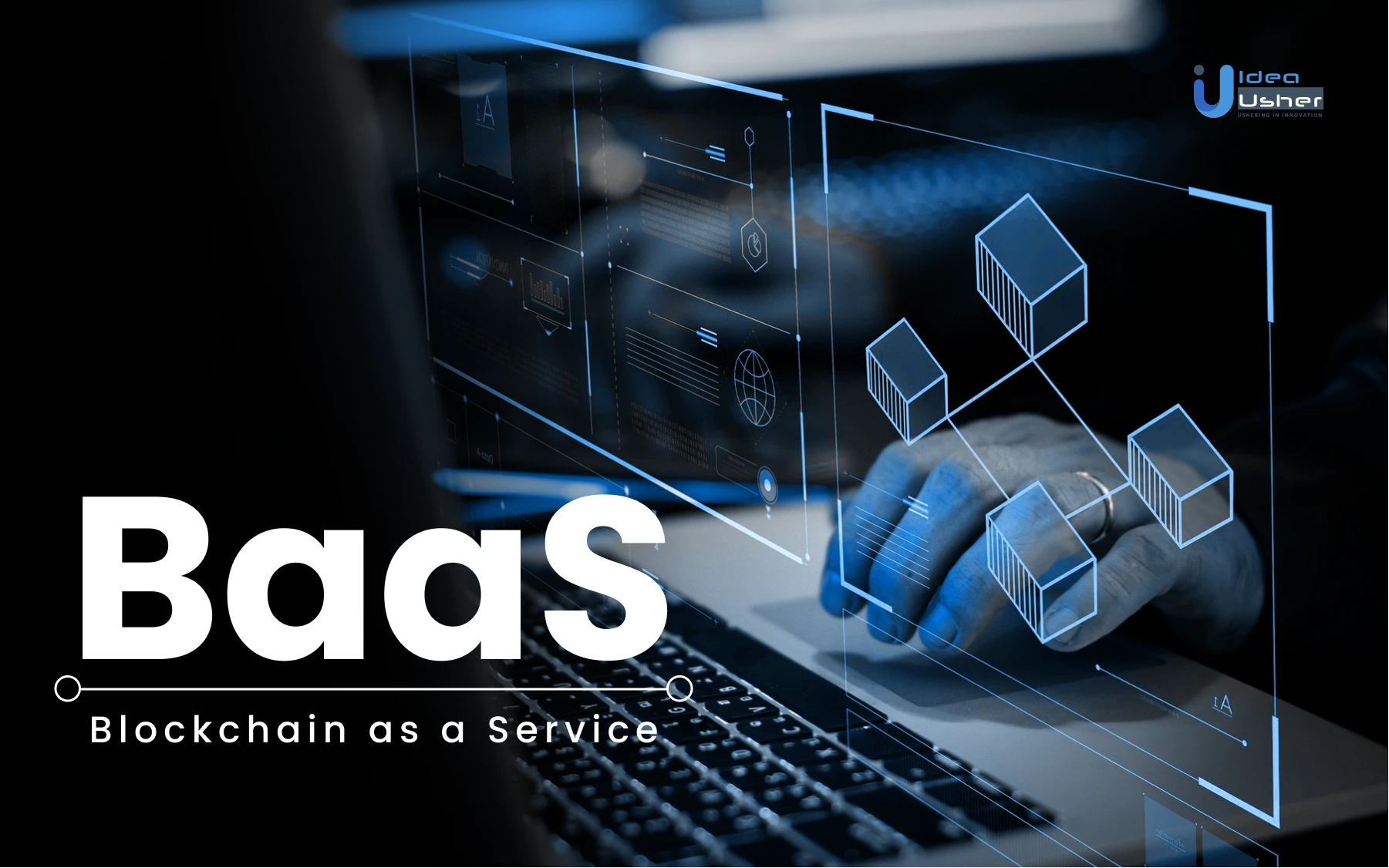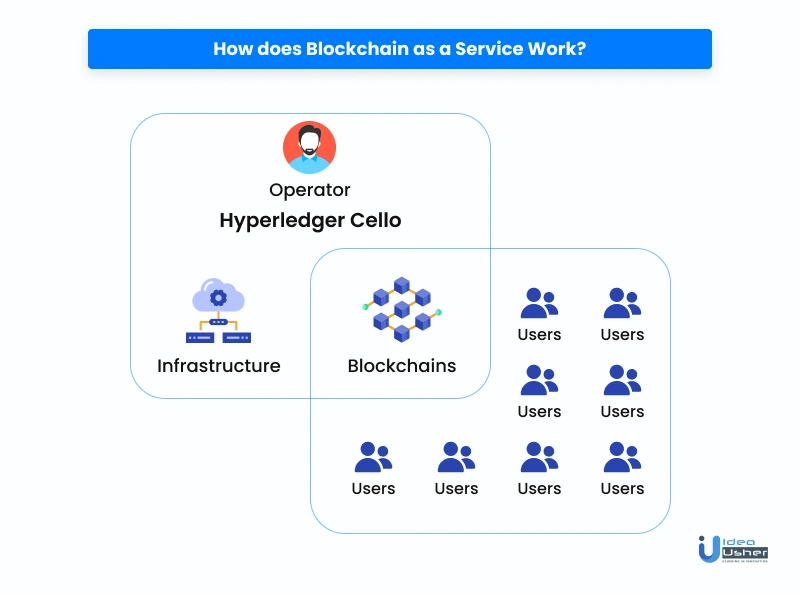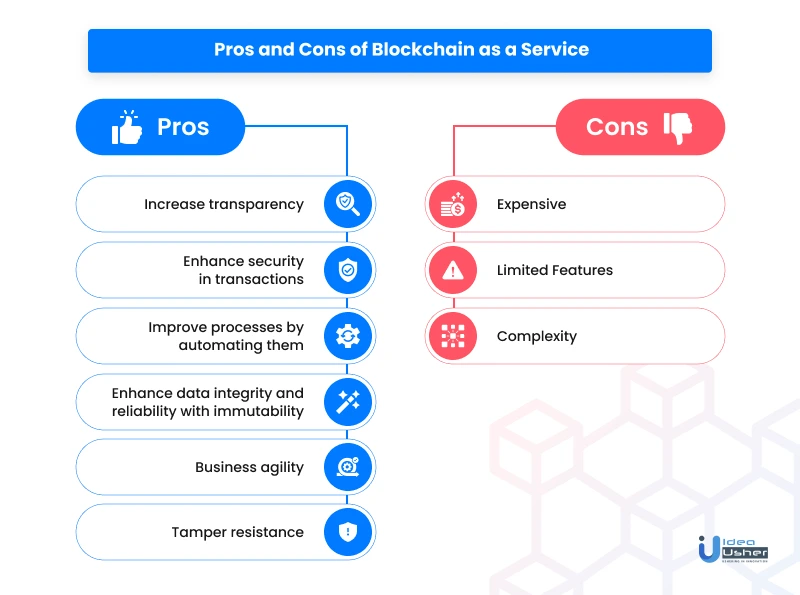
Have you ever heard of blockchain as a service? Better yet, do you know what it is and how it works? It’s not an everyday term. However, as technology continues to grow, there is no doubt that more and more of us will be hearing about this relatively new platform for storing information and digital transactions.
Today we’ll dive into everything you need to know about this platform. What is it, how does it work, and what are the advantages and disadvantages of using it?
What is Blockchain as a Service?
Blockchain as a Service (BaaS) offers cloud computing platforms that provide tools for developing and managing blockchain networks. BaaS offers the infrastructure, network, and marketplace required to develop and deploy blockchain applications.
The BaaS platform helps users build their blockchain-based applications without prior knowledge or experience in this field. Examples include smart contracts, cryptocurrency wallets, supply chain management systems, etc.
Market Overview of Blockchain-As-A-Service

Source: alliedmarketresearch
The surge in cybercrime following the COVID-19 pandemic has fueled the adoption of Blockchain-as-a-Service (BaaS) solutions. This increased demand stems from BaaS offering a more secure alternative for data management. Additionally, the growing complexity of the global financial sector has driven the need for robust and transparent solutions, making BaaS an attractive option.pen_spark
Why Does Your Business Need BaaS?
Blockchain technology has the potential to revolutionize every industry, from healthcare to finance. However, it can be difficult for companies to implement blockchain solutions because of their complexity and cost.
BaaS eliminates these barriers. It allows you to develop apps on top of existing blockchains without worrying about building or maintaining your network.
With BaaS, you can focus on growing your app instead of managing infrastructure and other technical aspects of deploying blockchain solutions.
The need for Blockchain as a service is growing rapidly. Many industries, including healthcare and government, can benefit from blockchain technology. Also, many other sectors can be disrupted by the use of blockchain technology.
Here are some reasons why you should consider adopting BaaS:
1. Streamline your supply chain management process
With blockchain technology, you can track every step of your supply chain, from when it leaves the factory to when it reaches its final destination. This gives you greater visibility into where delays may occur and where there are opportunities for improvement.
2. Improve data security and transparency
Blockchain eliminates the need for trusted third parties like banks or governments when processing transactions. Thus, no one person has control over your data. This increases security because there are no centralized points of failure. If one computer fails, the rest can still continue working seamlessly. The decentralized nature also means there’s no single point of failure. So, there’s less risk of malicious attacks like hacking or identity theft.
3. Reduce fraud in financial transactions
Blockchain technology allows two parties to exchange money without having to trust or even know each other’s identities. This means you can send money anywhere worldwide without worrying about fraud or theft. Thus, all transactions are recorded publicly on a permanent ledger that can’t be tampered with by anyone but its owners.
4. Automate contract management processes
BaaS helps you automate contract management processes. When you use the blockchain to store information, it’s easier to keep tabs on who has access to the data. In addition, you can use BaaS to automatically enforce terms of service and other contractual agreements with customers and partners.
5. Simplify cross-organizational collaboration
Blockchain removes the need for third parties when exchanging information between organizations, meaning workflows can be streamlined significantly. This helps companies save time and money on overhead costs. This includes managing multiple contracts with different suppliers, coordinating tasks between teams, or completing complex tasks on time.
How Does BaaS Work?

The image above shows the working of one of the BaaS, Hyperledger Cello. You could better understand how it works by comparing a BaaS provider to a web hosting provider. The provider oversees the web hosting and maintenance. However, it is up to the users to create, use, and deploy the website.
Here’s how it works:
- A company creates an account with a BaaS provider and then builds an application based on the company’s requirements.
- The application is uploaded onto the provider’s servers and linked to other applications if necessary.
- Once the company approves, it’s available for all employees to use through a web portal or mobile device app.
A BaaS solution typically includes three key components:
| Component | Function |
| Platform that runs on the server | 1. Manages user accounts, their access data, and encryption keys. 2. Has an API (application programming interface) that other applications can use to connect. |
| A platform that runs on the server | 1. Accesses data from the BaaS platform. 2. Presents data to users. 3. Stores data locally. |
| Mobile development framework | 1. Allows developers to build their apps with the API used by the BaaS platform. |
BaaS solutions are designed to support business processes that depend on data stored in the cloud. These solutions help organizations to build new applications or integrate existing applications with cloud-based services.
BaaS solutions provide users with a wide range of features and functionalities, including
1. Data storage
BaaS solutions allow users to store data in the cloud, which can be accessed anywhere in the world. This makes it easy to share data within an organization and with external partners, such as clients or customers.
2. Development tools
BaaS solutions come with various development tools and templates. They allow users to build new applications or integrate existing ones with cloud-based services quickly and efficiently. These tools include application programming interfaces (APIs), developer consoles, and SDKs (software development kits).
3. Security tools
Some BaaS solutions offer advanced security features like encryption, access control lists (ACLs), and role-based access control (RBAC), which help protect data from unauthorized access.
Highlighted Cloud Blockchain Service Providers
The following are the top-most blockchain as a service providers:
1. Google Cloud Blockchain Services
It is a blockchain-as-a-service (BaaS) platform that helps build enterprise-grade applications on the blockchain. It provides the tools for developers to develop and test blockchain applications in a fully managed environment.
The service includes a suite of developer tools and managed services for deploying and managing blockchain networks on the Google Cloud Platform (GCP).
Google Cloud Blockchain Services provides
- Creating, deploying, and managing blockchain networks.
- Creating, deploying, and managing smart contracts in Solidity language.
- Building mobile apps with user authentication via Google Identity Toolkit.
2. Microsoft Azure Blockchain Services
The Azure platform has been around for a while and is one of the world’s most mature public cloud platforms. As such, it’s no surprise that Microsoft is one of the first to offer BaaS.
Azure BaaS offers three main services:
- Blockchain as a Service – This provides the infrastructure for building blockchain applications by leveraging the Ethereum platform. It includes Ethereum client software, a Solidity compiler, an IDE, and sample contracts. You can also create and deploy your own private Ethereum blockchain network with this service.
- Blockchain Networking Service – This service allows you to connect your blockchain applications to other services in the cloud (like storage accounts) or on-premises using APIs. You can also link multiple blockchain networks together using this service.
- Blockchain Explorer Service – This provides an explorer that lets you view all transactions on your blockchain network(s) and track assets associated with them (such as digital tokens).
3. AWS Blockchain Services
AWS Blockchain Services is a blockchain-as-a-service (BaaS) platform that helps you to build, deploy and manage scalable blockchain networks. It provides a set of preconfigured blockchain templates, which you can use to rapidly build secure blockchain networks using open-source frameworks like Ethereum and Hyperledger Fabric.
AWS Blockchain Templates help you to quickly create and deploy secure blockchain networks using open-source frameworks like Ethereum, Hyperledger Fabric, and many more.
The Blockchain Workbench is a fully managed service that allows users to create and deploy their own private, semi-private, or consortium blockchains on the AWS Cloud.
4. IBM Cloud
IBM has been making waves in the blockchain space for some time, first introducing its blockchain platform for developers in 2016. The company’s blockchain-as-a-service offering is based on Hyperledger Fabric, an open-source project developed by the Linux Foundation and hosted by The Linux Foundation.
IBM’s service allows users to create their own Hyperledger Fabric networks and use them to build and deploy applications. The software giant also provides users access to its developer community, which can be valuable for those seeking expertise in this emerging technology.
5. Oracle Cloud
Oracle Cloud is a comprehensive cloud services platform that enables organizations to build and run cloud-native apps on any infrastructure. With Oracle Cloud, enterprises can accelerate the delivery of business value from the cloud while simultaneously improving operational efficiency and reducing costs.
Oracle Blockchain Cloud Service is an enterprise-ready blockchain platform that allows users to create and deploy distributed ledger networks. The service enables integration with Oracle Cloud, enabling end-to-end management of blockchain networks.
Pros and Cons of Blockchain as a Service
BaaS An easy-to-use cloud platform that lets you create and manage your blockchain applications. The technology is still relatively new, so only a few providers offer BaaS. It provides a wide range of features and benefits. Still, we’ve identified six pros of BaaS:

1. Increase transparency
BaaS has a high level of transparency because anyone with access to the network can view every transaction made on it. This makes it easy for companies to ensure that their transaction history isn’t altered or changed without their knowledge or permission.
2. Enhance security in transactions
The biggest benefit of a BaaS is security. It offers businesses a way to store user information and protect that data from third parties. This helps keep hackers out and ensures that companies don’t have to worry about their customers’ personal information becoming compromised.
3. Improve processes by automating them
BaaS can automate business processes and enable organizations to perform tasks faster and more efficiently. Hence, it can reduce human error and improve the quality of work. It also helps in reducing costs because it doesn’t require much time or manual effort to complete tasks.
4. Enhance data integrity and reliability with immutability
Backend as a service offers a more predictable, reliable, and scalable experience with your data. When you use BaaS, your data is stored in a centralized location and is committed to the blockchain. No matter how many users or applications access the data, it’s always available. And because it’s stored on the blockchain, it can never be changed or corrupted by an individual user or application.
5. Business agility
As BaaS is a cloud service, it enables businesses to deploy applications quickly without investing in infrastructure and maintenance costs, which helps with business agility. With BaaS, organizations don’t have to worry about scaling out their applications since they don’t have to worry about scaling out their databases either. This means faster time to market for new products and services.
6. Tamper resistance
Since every transaction must be signed with the creator’s private key before being broadcasted onto the network, only he or she can post it onto the web to become valid. This means that if any other person tries to broadcast a transaction on your behalf without your permission.
However, there are some disadvantages to using BaaS. These include:
1. Expensive
Because you are leasing rather than buying resources, your costs will be higher than if you owned those resources. It also makes sense for bigger companies that need more power than they can afford on their own but don’t want to invest in expensive hardware or software licenses.
2. Limited Features
BaaS solutions are limited to the features supported by the underlying platform. For example, if you choose Salesforce as your BaaS provider, its features will be limited to CRM only. You cannot build an application using Salesforce BaaS and expect it to support other functionalities such as eCommerce or a content management system (CMS).
3. Complexity
The BaaS model encourages developers to use the existing platform components instead of creating their own. This makes the development process complex and time-consuming since developers need to understand how these components work to use them.
The Bottom Line
People are increasingly using cloud services, which have become popular because they offer businesses a convenient way to store and access data from anywhere. Businesses also use cloud infrastructure to run their applications. As a result, there has been an increase in business-oriented cloud service providers offering software-as-a-service (SaaS) offerings.
Backend as a Service is an emerging category that has been growing in popularity for several years but hasn’t reached its full potential.
BaaS is useful for companies that want to create an application without handling the technical aspects of building a database. This can be especially helpful for startups and small businesses with limited resources.
There are dozens of BaaS providers, but they all have one thing in common: They make it easier for developers to build apps without creating their infrastructure. This means that you need less time and money to build an app. Hence, more time and money can be spent on ensuring your app works well and is useful to customers!
Still in doubt? Connect with blockchain experts at Idea Usher who can help you understand BaaS. They can also guide you on how you can enhance your business with BaaS.
Contact us to dig in deeper and find out how you can implement BaaS in your business.
E-mail: [email protected]
Phone Numbers : (+91) 946 340 7140, (+91) 859 140 7140 and (+1) 732 962 4560
FAQs
Q. What is Blockchain as a Service (BaaS)?
Blockchain as a Service (BaaS) is a cloud-based solution that allows businesses to leverage blockchain technology without building their own infrastructure. It’s similar to how Software as a Service (SaaS) provides access to software applications. BaaS providers handle the complex backend operations of a blockchain network, allowing businesses to focus on developing their blockchain applications and smart contracts.
Q. What is SaaS in blockchain?
SaaS (Software as a Service) and BaaS (Blockchain as a Service) are very similar concepts. Both provide access to a service through a cloud-based platform. However, SaaS deals with traditional software applications, while BaaS specifically focuses on blockchain technology and its applications. So, whenever you hear “SaaS in blockchain,” it’s most likely referring to BaaS.
Q. What is Blockchain Platform as a Service (PaaS)?
There isn’t a widely used term “Blockchain Platform as a Service” (PaaS). PaaS typically refers to cloud-based platforms for developing and deploying applications. While BaaS offers a platform to build blockchain applications, it also takes care of the underlying blockchain infrastructure. BaaS can be considered a more comprehensive solution than a traditional PaaS offering.
Q. What are the biggest advantages of using BaaS for my business?
BaaS offers several significant advantages for businesses:
- Faster Time-to-Market: By eliminating the need to build and manage your own blockchain infrastructure, BaaS allows you to develop and deploy blockchain applications much more quickly.
- Reduced Costs: BaaS removes the upfront investment required for hardware, software, and personnel to manage a private blockchain. You only pay for the resources you use.
- Increased Scalability: BaaS platforms are designed to handle fluctuating demand, so you can easily scale your application up or down as needed.
- Enhanced Security: BaaS providers invest heavily in security measures to protect your data on the blockchain.
- Focus on Core Business: BaaS frees your team to focus on developing innovative blockchain applications and functionalities instead of managing infrastructure.
Q. What are some common use cases for BaaS solutions?
BaaS solutions can be applied across various industries and functions. Here are some common examples:
- Supply Chain Management: BaaS can track the movement of goods throughout the supply chain, ensuring transparency and immutability of data.
- Financial Services: BaaS can be used for secure and efficient cross-border payments, trade finance, and asset management.
- Voting and Identity Management: BaaS can create secure and verifiable voting systems and streamline identity management processes.
- Healthcare: BaaS can securely store and share patient medical records, improving data privacy and accessibility.
- Loyalty Programs: BaaS can power tamper-proof loyalty programs that reward customers for their engagement.
Q. What businesses benefit the most from BaaS?
As we’ve seen, blockchain is a disruptive technology that can be applied to many industries. While some businesses will benefit more than others, the technology can potentially improve any business that deals with transactions.









Bristin Borah